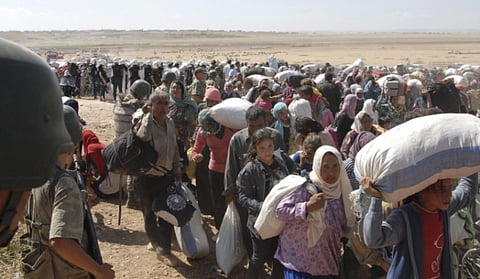Kurds fleeing Isil attacks allowed into Turkey
Isil advance forces Turkey to open border with Syria Friday to about 4,000 Kurdish refugees who had been denied entry for the past 2 days

DIKMETAS, Turkey: Close to a thousand Syrian Kurds gathered on the border seeking to cross into Turkey on Friday after Isil fighters seized 21 villages and besieged a Kurdish city in northern Syria, a Reuters witness said.
The crowd of mostly women and children sat behind a barbed wire barrier along the border opposite the Turkish village of Dikmetas, 20 km (12 miles) from the Syrian Kurdish city of Ayn Al-Arab, known as Kobani in Kurdish.
The attack on Kobani prompted a Kurdish militant call to the youth of Turkey’s mainly Kurdish southeast to join the fight against Isil and came days after the US military said the help of Syrian Kurds would be needed against the militants.
The number of Kurds on the border shrank from about 3,000 on Thursday night, but more were arriving on foot from nearby villages, carrying possessions in sacks, witnesses said.
Turkish security forces were not allowing them to cross the border.
“The weather was cold overnight so most went back to their villages. They started coming back to the border this morning,” said Halil, a man in his 40s on the Turkish side of the border.
Turkish soldiers armed with rifles formed a line to maintain security along the border but allowed locals on the Turkish side to fling across bottles of water and bags of bread.
“People are continuing to come on foot and by vehicle. We expect their numbers to swell to 3,000-4,000,” said village official Huseyin Gundogdu.
He said military and humanitarian officials had visited the area and were telling the Syrian Kurds they would be offered aid further along the Syrian side of the border nearer Kobani.
“AID WITHIN SYRIA’S BORDERS”
Prime Minister Ahmet Davutoglu said the governors of border provinces in Turkey, where Kurdish militants have waged a decades-long insurgency to push for greater autonomy, had been ordered to extend aid to refugees on Syria’s side of the border.
US President Barack Obama said last week he would not hesitate to strike Isil, which has used Syria as a base to advance its plan to reshape the Middle East.
The United States and France are conducting air strikes against Isil in Iraq and last month Obama authorised surveillance flights over Syria.
Isil fighters, armed with heavy weaponry including tanks, have seized 21 villages near Kobani in the last 24 hours, the Syrian Observatory for Human Rights, which tracks Syria’s civil war, said on Thursday.
Western states have expanded contact with the main Syrian Kurdish party, the PYD, since Isil seized wide areas of Iraq in June.
The YPG, the main Kurdish armed group in Syria, says it has 50,000 fighters and should be a natural partner in a coalition the United States is trying to assemble to fight Isil.
But the Syrian Kurds’ relationship with the West is complicated by their ties to the Kurdistan Workers’ Party (PKK) - a group listed as a terrorist organisation in many Western states because of the militant campaign it waged for Kurdish rights in Turkey.
ISIL CLOSE TO SYRIAN BORDER
Hundreds of refugees streamed across a border checkpoint near the Turkish town of Suruc amid gunfire and a mortar round striking a village on the Syrian side, live CNNTurk television footage showed.
Isil fighters are within two kilometers of the Turkish border, CNNTurk said.
Refugees left behind flocks of sheep, trucks and other vehicles as they approached Turkish soldiers manning barbed wire defenses at the border. One woman collapsed after crossing into Turkey with her belongings and was seen being carried away by two soldiers.
“We are and we will accept all of our brothers from Syria fleeing the threat of death and seeing Anatolia as a a safe haven,” Prime Minister Ahmet Davutoglu told reporters in televised remarks during a visit to Baku, Azerbaijan.
He said a “sudden development” in Syria had lead to Turkey opening its borders.
The Kurdish refugees are the latest minority group to be targeted by Islamic State as it expands its territory in Syria and Iraq, and the exodus follows those of Christian and Yezidi ethnic minorities after they were targeted by the militants.
Militant Advance
Islamic State controls two dozen Kurdish villages around the town of Ayn-al Arab, the UK-based Syrian Observatory for Human Rights said in an e-mail Friday. The militant group’s advance follows fierce clashes with the Kurdish force known as the People’s Protection Units that began on Sept. 16.
Turkey has refrained from publicly backing a US-led coalition against Islamic State, citing concerns about 49 Turkish hostages being held by militants in Iraq since June.
Still, US officials say Turkey, while avoiding public statements that could put the hostages in danger, has stepped up controls on its border with Syria.
Turkey is currently home to around 1.5 million refugees from the fighting in Iraq and Syria. Davutoglu, however, said today that Turkey’s priority was to aid refugees across the border as long as the security situation permits.
There were unconfirmed reports yesterday that Turkey was considering creating a buffer zone within Syria. Davutoglu’s government is expected to renew a mandate to deploy Turkish troops in Syria and Iraq if needed next month in parliament, Yeni Safak newspaper said Friday, without citing anyone.


